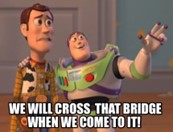Is your friend scared about an upcoming event? You could tell them to calm down, and you’ll cross that bridge when you get to it. This post unpacks the meaning and origin of this expression.
Meaning
The expression “cross the bridge” means to delay worrying about events that might not occur. It means you’ll deal with a situation when it arises. If you “cross a bridge when you get there,” it means avoiding trying to solve a problem before it arrives.
You wait until it becomes an issue before you attempt to solve it. It’s a way of telling someone to avoid stressing out about something that’s not immediately apparent.
Example Usage
"Don't worry about how to handle the client. We'll cross that bridge when we get there. For now, we'll just focus on making it work for the rest of the team."
"This is becoming a problem, but it's nothing to worry about right now. We'll cross that bridge when it gets here. For now, just relax and put it out of your mind."
"I'm telling you, don't worry about it, man. We'll cross that bridge when it gets here. For now, we'll just keep doing what we're doing."
"The exam is at the end of the month. We haven't started studying, but we still have time. We'll cross that bridge when it gets here. For now, we'll go out tonight and have some fun."
"I know you think it's a big deal, but we'll cross that bridge when we get there. You're blowing things out of proportion right now, don't stress about it."
"Is there a reason why you're stressing about things? There's nothing you can do about it right now. We'll cross that bridge when we get there. Just relax."
"We'll cross that bridge when we get there. Let's just let things happen naturally. There's no reason to get out of hand right now."


Origin
The expression "cross the bridge" originates from before the 1800s. During this time, the crossing of bridges involved long journeys on foot or on horseback. Crossing a bridge exposed travelers to hijacking from highwaymen, as it created a chokepoint.
As a result, it was a cause of worry for travelers. People in the caravan would talk in fear about the bridge, with the group's leader saying, "we'll cross that bridge when we get to it," to calm the troops.
The modern use of the phrase, including the conjunction, was first recorded in the work of Henry Wadsworth Longfellow, "The Golden Legend," published in 1851, where it reads as follows.
"Don't cross the bridge till you come to it, is a proverb old and of excellent wit."
Phrases Similar to Cross the Bridge
- Chill out.
- We’ll take care of it later.
- Clam down.
- Don’t worry about it.
Phrases Opposite to Cross the Bridge
- Leave it alone.
- Confront it head on.
- Worry about it now.
What is the Correct Saying?
- Cross the bridge.
- Cross that bridge.
Ways People May Say Cross the Bridge Incorrectly
The phrase “cross the bridge” doesn’t have anything to do with walking across bridges. The “bridge” in the saying is a problem or event. To “cross” the bridge means you’ll tackle the problem. Using it to refer to crossing bridges is incorrect.
Acceptable Ways to Phrase Cross the Bridge
You can use the phrase “cross the bridge” when you want to tell people that there is no urgency to resolve a problem immediately. You can say, “we’ll cross that bridge when we get there,” to tell someone to focus on the current situation, not the future. It’s like saying, “what will be will be.”
The phrase suits social and professional situations. You could tell your employees to stop stressing about how to handle a client and tell them you’ll cross that bridge when it gets here. You could tell your family to stop worrying about where to go for dinner on your birthday, and you’ll cross that bridge when you get there.